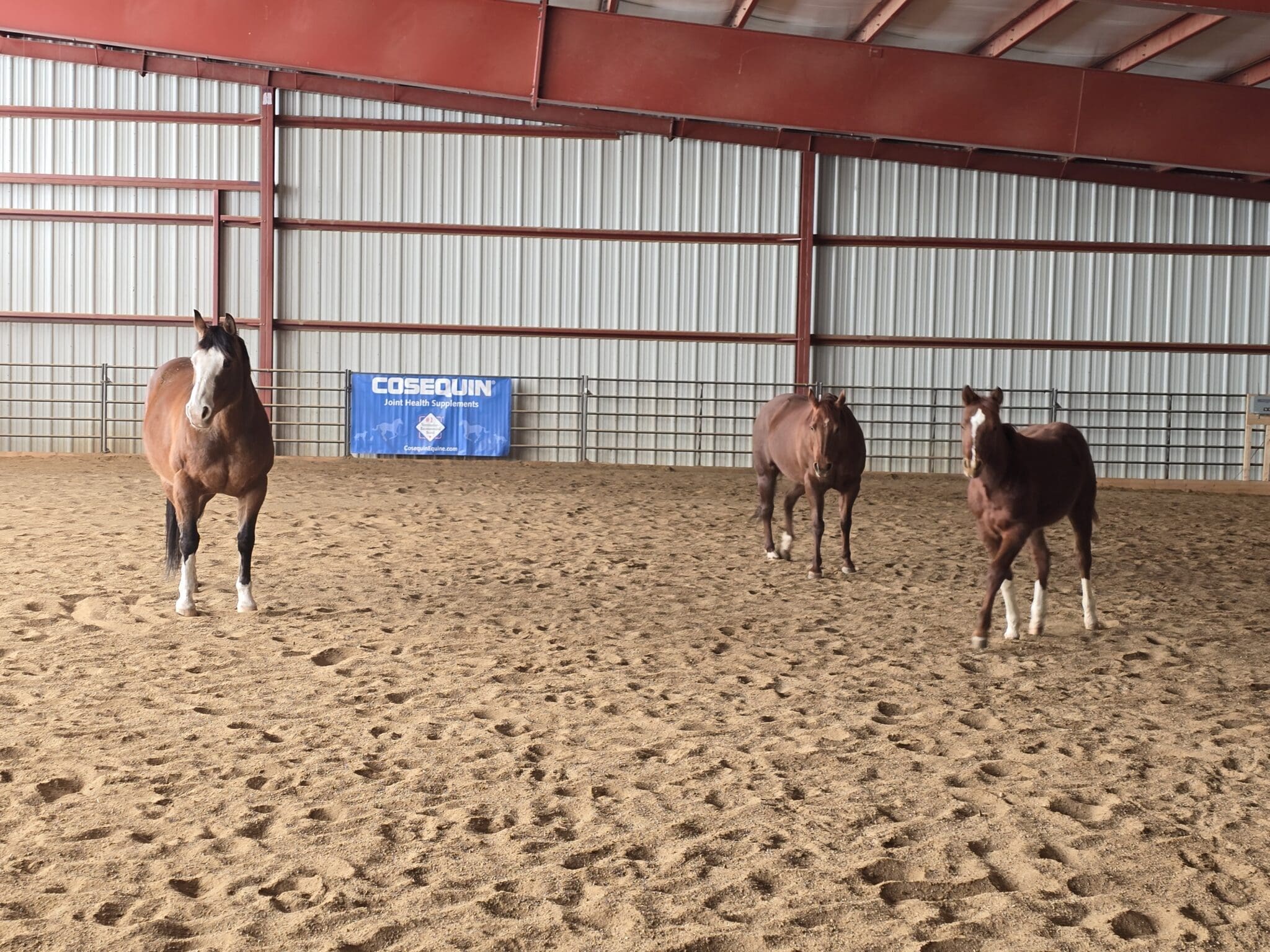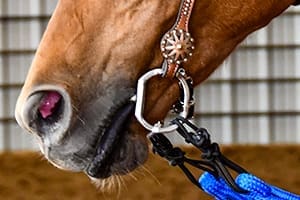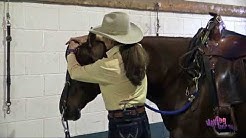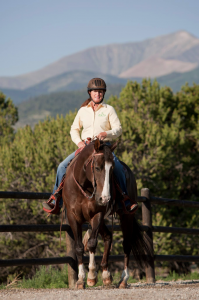
Horses have their own gravity. If you’ve loved them in the past and been pushed away because of an injury or accident, it’s possible you’ll be drawn right back to their beautiful, sleek, powerful sides. Gravity pulls you back even if your worries or fears make you wonder why, even when our biological responses to fear tell us not to go back to a dangerous situation. Here’s a look at why I think horsemen want to overcome the very natural fears that enter in after accidents with horses.
I often wonder why we want to be around horses when horses step on your feet, bite, kick, and buck you off. Have you ever had your foot stepped on by a horse? Been bitten? Been kicked? Have you ever fallen off or gotten bucked off your horse? Have you ever started out on a ride and ended up at the Emergency Room? I ask these questions to rooms full of horse people and just about all raise their hands.
Why do we do this? Gravity. Horses have a power to draw us in, make us learn from our mistakes and prompt us to keep trying.
I do hope that you are never hurt by horses—physically or physiologically. I do believe that if you are conscientious, systematic and methodical about safety, the chances of getting hurt are greatly reduced. I’ve worked with many large riding operations through the Certified Horsemanship Association (a nonprofit organization focused on horsemanship safety and excellence) and seen many of them that have almost zero incident rates. That’s not luck— that’s by design. But I realize accidents do happen. Horses are powerful beings with their own minds and strong bodies.
Let me go on record here: I DO NOT believe that getting hurt should be an expected or accepted outcome with horses. I DO believe that most, if not all, accidents are preventable and no matter how wild and unpredictable we think horses are, if you really analyze an accident, you’ll find a way you could’ve prevented it. I know for myself that when I look at the horse wrecks I’ve been in, they all started with me doing something stupid or going against that little voice in my head that tried to warn me.
Still, even when we make a commitment to safety, things happen. Horses are big and flighty animals and it’s a given that bumps, bruises and scrapes will happen–even in the best of circumstances. And when you are perched on top of a half-ton of live and somewhat volatile horse flesh with a balance of its own and–more significantly–a will of its own, you will on occasion have an unscheduled dismount. I’ve sure had my share, but fortunately I’ve never had more than a few broken ribs to contend with. But that was enough to mess with my head. With my chosen profession and my love of horses, I had to work through the worry.
Biology of Fear
I’ve known plenty of riders who have had incidents with horses that resulted in serious injury– I’ve heard stories that are so horrific that I wonder why the person would ever want to ride again. But amazingly, they do. Gravity.
Our hard-wired biological responses after a traumatic event can be hard to overcome, but overcoming is possible. Our love of horses makes us want to overcome. When an accident or injury occurs, a “fear memory” is lodged in your mind; it’s purpose is to remind you of this injury so it doesn’t happen again. Fear memories are supposed to prevent us from doing a stupid thing again, like reaching out and touching a hot wood stove. But when coming back after a riding accident, sometimes fear memories get in our way of hopping back into the saddle.
Fear memories can not be deleted, but you can learn to manage them. If you were bucked off and hurt one day when you asked your horse to canter, the next time you canter (or even think about it) that fear memory will surface— it’s a biological fact. So don’t let it surprise you and don’t let it take control. Expect the fear memory to surface and have a plan to keep it at bay.
I think it is really important to “intellectualize your fear” after an accident. When enough time has passed and you have healed both physically and emotionally, it is important to thoroughly analyze what happened. What went wrong and what you might have done to prevent it from happening?
Learning from your mistakes and understanding the situation better should help diffuse your fear. If, for instance, you ignored an earlier warning sign, then you can make up your mind to never do that again. Knowledge and understanding of how an accident may have been prevented—and establishing concrete actions you can take in the future to prevent a repeat–will lead to more confidence.
Fear is a powerful emotion and it is generated from a subconscious part of the brain. But you can learn to control your fear. It’s not always easy; it’s something you have to work at, but it can be done. Coming back after an accident will require some work and self-discipline on your part, but I know many, many people who have done it. Their love of the sport, the way of life and the love of their horses seems to drive them to face that fear and create a plan to overcome.
Answer this: Why?
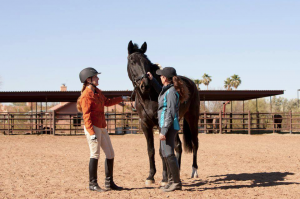
After you’ve had an accident or mishap, it is critically important that you do some serious introspection to determine why you are doing this horse thing. Why are horses important to you and why do you want to keep riding?
These are not easy questions to answer but the answers are critically important to your comeback. You have to decide if horses are pulling you back. You have to know if you are being pulled by their gravity or just think you “should” ride again.
“Why?” is always the most difficult question to answer; how and what are much easier. But there are reasons why you are committed to coming back to riding and it is important to get in touch with those reasons, because of this simple fact: purpose leads to courage. If you can really come to terms with why you want this so badly, then you remind yourself of that purpose when things get tough, your purpose will give you courage.
Plan of Action
Your fear can come back to you like gravity just like your love of horses. Fear has a way of finding its way in—especially if you don’t have a plan to subdue it. When coming back after an accident or injury, it is important to practice mental control. Know that your fear memory will surface— don’t let it take you by surprise or dictate your actions. Your thinking, your body language and your emotions are all connected: mind, body and spirit. When the emotion of fear takes over, your mind devolves into negative “what if” thinking and your posture starts to reflect the emotion too.
Here is the secret key to overcoming your fear– keep your mind operating in a proactive and positive way (plan ahead of time what you will think about or what song you will sing; disallow negative thoughts and replace them quickly). If you think of falling each time you mount up, make a list of all the wonderful rides you’ve had and focus on those memories. Feel those wonderful rides. Make that memory a reality in the present. Make sure your body language shows confidence (sit up straight, square your shoulders– look tough!). By keeping control of the mental and the physical aspects of your being, the emotion doesn’t stand a chance.
A recap and to-do list: Analyze what happened to cause your fears, know what lessons can be learned and make a commitment to safety. Gain a better understanding of why you are doing this; the ‘why’ is your purpose, your “gravity. ” Purpose leads to courage. Finally, make sure you have a plan of action when you ride: practice deep breathing, keep your eyes focused and your mind engaged in a positive direction, and keep your body language strong and confident.
You can do it! I hope your love of horses pulls you back to the fun of the sport.
 Horses have their own gravity. If you’ve loved them in the past and been pushed away because of an injury or accident, it’s possible you’ll be drawn right back to their beautiful, sleek, powerful sides. Gravity pulls you back even if your worries or fears make you wonder why, even when our biological responses to fear tell us not to go back to a dangerous situation. Here’s a look at why I think horsemen want to overcome the very natural fears that enter in after accidents with horses.
Horses have their own gravity. If you’ve loved them in the past and been pushed away because of an injury or accident, it’s possible you’ll be drawn right back to their beautiful, sleek, powerful sides. Gravity pulls you back even if your worries or fears make you wonder why, even when our biological responses to fear tell us not to go back to a dangerous situation. Here’s a look at why I think horsemen want to overcome the very natural fears that enter in after accidents with horses. After you’ve had an accident or mishap, it is critically important that you do some serious introspection to determine why you are doing this horse thing. Why are horses important to you and why do you want to keep riding?
After you’ve had an accident or mishap, it is critically important that you do some serious introspection to determine why you are doing this horse thing. Why are horses important to you and why do you want to keep riding?
